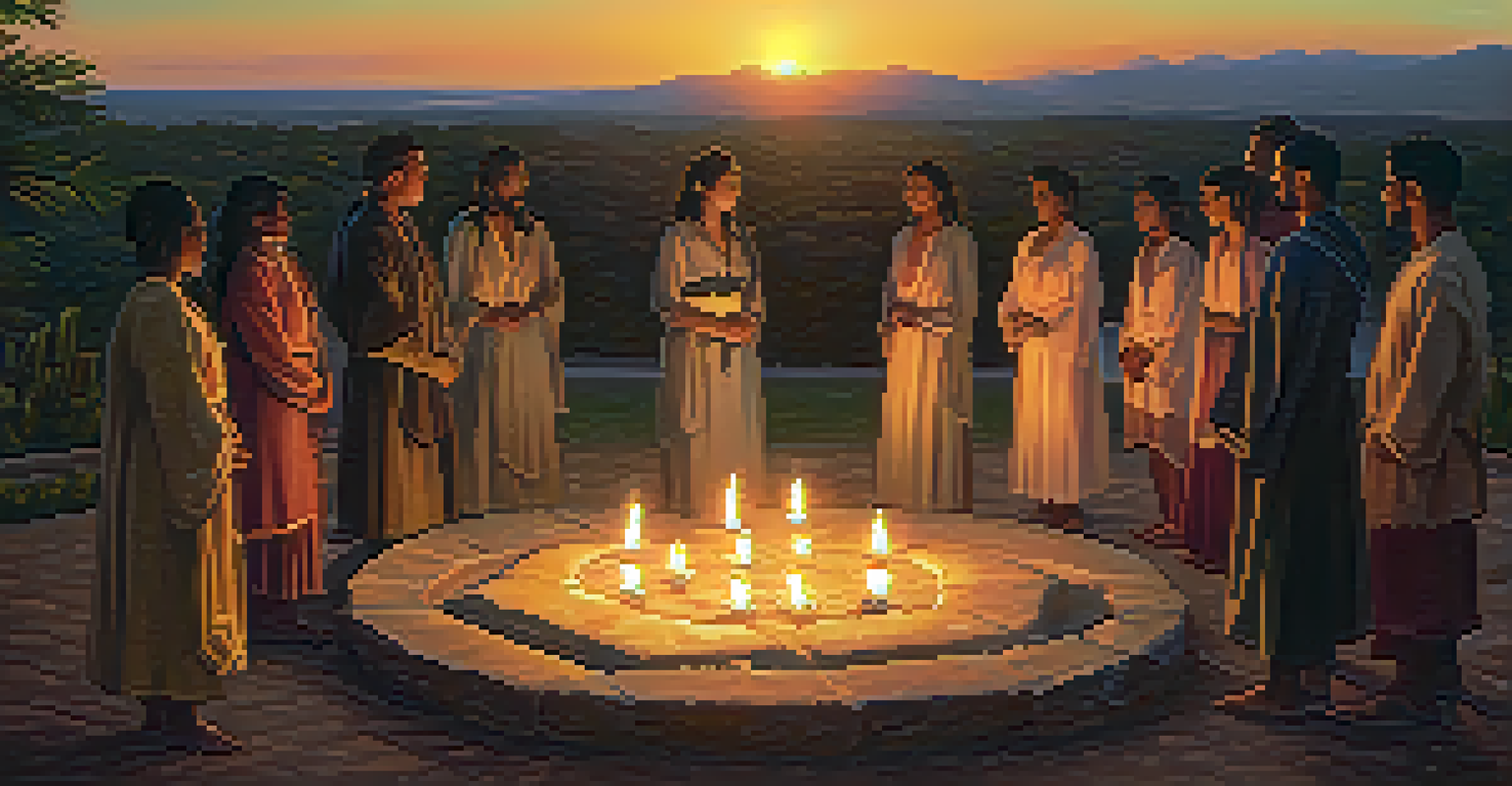The Influence of Community Leaders on Spiritual Development

Understanding Spiritual Development and Its Importance
Spiritual development refers to the growth of an individual's inner self, beliefs, and values. It often involves a journey of self-discovery and connecting with something greater than oneself, whether that’s a higher power, nature, or humanity. This process is essential as it helps individuals find purpose, meaning, and a sense of belonging in life.
The spiritual journey is individual, but certain spiritual experiences can also be shared, which deepens the connection with others.
In many communities, spiritual development is not just a personal endeavor; it’s a collective experience. As people engage with their beliefs and values, they often seek guidance and support from those around them. This is where community leaders play a pivotal role, providing the framework and encouragement necessary for individuals to explore their spirituality.
By fostering an environment that values spiritual growth, community leaders help individuals feel more connected, not only to themselves but also to the people and world around them. This interconnectedness can lead to a more harmonious community where empathy, understanding, and collective growth are prioritized.
The Role of Community Leaders in Spiritual Guidance
Community leaders, whether they are spiritual figures, educators, or activists, often serve as guides for spiritual development. They can share wisdom, provide resources, and create safe spaces for individuals to explore their beliefs. Through mentorship and encouragement, these leaders help people navigate their spiritual journeys with confidence.

Moreover, leaders can introduce practices and rituals that resonate with the community, fostering a shared sense of spirituality. For instance, organizing meditation sessions, prayer groups, or community service projects can deepen individuals' spiritual experiences and connections. These activities not only benefit participants but also strengthen community bonds.
Spiritual Growth Fosters Community
Engaging in spiritual practices collectively cultivates unity and shared purpose within communities.
Ultimately, the influence of community leaders in spiritual guidance can have a profound impact on individuals’ lives. Their support and encouragement allow people to embrace their spirituality more fully, leading to personal transformations and a more cohesive community.
Building Stronger Communities Through Spirituality
Spirituality often acts as a glue that binds communities together. When individuals engage in spiritual practices collectively, it cultivates a sense of unity and shared purpose. Community leaders can harness this power by creating inclusive environments that welcome diverse spiritual perspectives, allowing everyone to feel valued and heard.
Leadership is not about being in charge. It is about taking care of those in your charge.
For example, community events that celebrate various spiritual traditions can promote understanding and respect among different groups. This not only enhances spiritual development but also fosters tolerance and cooperation within the community. A united community, shaped by shared spiritual values, can tackle challenges more effectively.
As individuals grow spiritually, they are often inspired to give back, promoting a cycle of generosity and support within the community. Leaders who encourage this mindset can nurture a culture of kindness and service, reinforcing the idea that spiritual growth benefits not only the individual but the entire community.
The Impact of Shared Rituals on Spiritual Growth
Rituals play a significant role in spiritual development, offering a structured way for individuals to connect with their beliefs. Community leaders often facilitate these rituals, whether through religious ceremonies, seasonal celebrations, or personal milestones. Such shared experiences can deepen individuals’ spiritual connections and foster a sense of belonging.
Participating in rituals can evoke feelings of peace, joy, and purpose, reinforcing an individual's commitment to their spiritual path. When leaders create opportunities for these shared moments, they not only enhance individual experiences but also strengthen communal ties. It’s a beautiful synergy that benefits everyone involved.
Leaders Guide Spiritual Development
Community leaders play a crucial role in nurturing spiritual growth by providing guidance, resources, and safe spaces for exploration.
Furthermore, these rituals can become cherished traditions that are passed down through generations. This continuity not only preserves spiritual values but also enriches the community's identity, ensuring that spiritual development remains a vital part of the community's fabric.
Community Leaders as Role Models in Spirituality
Community leaders often set the tone for spiritual development by embodying the values they promote. Their actions, beliefs, and attitudes serve as examples for others to follow. When leaders openly engage in their spiritual practices, they inspire individuals to explore their own journeys more deeply.
For instance, a leader who demonstrates compassion, mindfulness, and integrity can encourage community members to adopt similar values. This ripple effect can lead to a more spiritually aware community where individuals strive to improve both themselves and the world around them. Authenticity in leadership is key to fostering trust and engagement.
Moreover, when leaders openly share their struggles and triumphs in their spiritual journeys, it humanizes them and creates a relatable connection. This openness can motivate others to confront their challenges, fostering resilience and growth. It’s a powerful reminder that spiritual development is a lifelong journey, filled with ups and downs.
Encouraging Dialogue on Spirituality and Growth
Open dialogue about spirituality is essential for fostering understanding and growth within a community. Community leaders have the unique opportunity to create platforms for these discussions, whether through workshops, forums, or informal gatherings. By encouraging individuals to share their perspectives and experiences, leaders can promote a culture of learning and curiosity.
When people feel comfortable discussing their spiritual beliefs, it can lead to new insights and greater empathy among community members. This exchange of ideas can challenge preconceived notions and inspire individuals to explore paths they may not have considered. The result is a richer, more diverse spiritual landscape.
Dialogue Enhances Spiritual Understanding
Open discussions about spirituality promote empathy and challenge misconceptions, enriching the community's spiritual landscape.
Additionally, these dialogues can help address misconceptions and bridge gaps between different spiritual traditions. By fostering respectful conversations, community leaders can cultivate a sense of unity that transcends differences, ultimately leading to a more harmonious and spiritually enriched community.
The Lasting Legacy of Community Leaders on Spirituality
The influence of community leaders on spiritual development extends far beyond their tenure. Their efforts to nurture spiritual growth can leave a lasting legacy that continues to shape future generations. By instilling values of compassion, service, and introspection, they create a foundation for ongoing spiritual exploration.
Communities that prioritize spiritual development often experience a ripple effect, as individuals inspired by their leaders go on to influence others in turn. This cycle of inspiration can lead to a vibrant community culture where spiritual growth is celebrated and supported. It’s a beautiful testament to the power of collective spirituality.

In conclusion, the role of community leaders in spiritual development is both profound and transformative. By guiding individuals on their journeys, fostering shared experiences, and encouraging dialogue, they help create communities that thrive spiritually, emotionally, and socially. The legacy of their influence can be felt for generations to come.